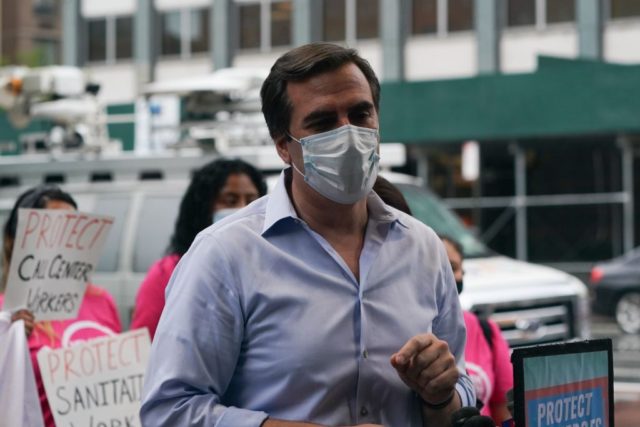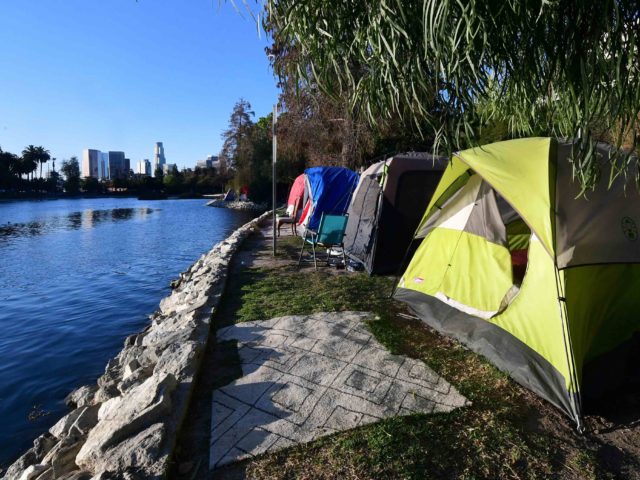New York Slashes Tax Breaks for Opportunity Zones Program that Provided Housing for 31M Americans

New York will no longer offer state tax breaks to real estate developers who invest in low-income neighborhoods — or opportunity zones — to improve the housing infrastructure across the United States.
Democrat New York State Senator Michael Gianaris is behind the measure that decouples New York state’s capital gains tax code from the federal program administered by U.S. Department of Housing and Urban Development (HUD) and that is now included in the recently approved state budget.
“Opportunity Zones are nothing more than a giveaway of public money to wealthy developers, and I’m glad New York took a stand against the much-abused program,” Gianaris (pictured) said in a statement.
The real estate website The Real Deal reported on the development:
New York joins North Carolina, California, Massachusetts, and Mississippi in separating its state tax regime from the federal Opportunity Zones program.
The program, which was created by Republicans’ 2017 tax overhaul, lets investors and developers defer or forgo some capital gains taxes by funding projects in any of 8,700 Opportunity Zones across the country.
New York has 514 census tracts included in the program. Developers will still qualify for federal tax breaks for investing in those so-called distressed areas.
Ken Weissenberg, a tax partner at EisnerAmper, said in The Real Deal article that the elimination of the tax benefit makes New York less attractive to investors.
“[It’s] another wedge to drive people out of New York,” Weissenberg said.
More than two dozen groups, including the leftwing New York State United Teachers and Communication Workers of America, supported eliminating the tax break.
Breitbart News reported on the impact of the Opportunity Zones program over the past four years:
For background, Opportunity Zones was created under the Tax Cuts and Jobs Act of 2017, shepherded and signed into law by President Donald Trump and, under the direction of HUD Secretary Ben Carson, it has resulted in providing housing and infrastructure for approximately 31.3 million Americans across all 50 States, the District of Columbia, and five U.S. territories.
“Over the last several years, Opportunity Zones have spurred $75 billion dollars in private sector investment and have created at least 500,000 new jobs in designated Opportunity Zone tracts,” a senior administration official at HUD told Breitbart News. “These new investments will lift at least one million Americans up out of poverty and onto the path toward self-sufficiency, decreasing the overall Opportunity Zone poverty rate by 11 percent.”
“We hope the next administration will continue to highlight this prosperous program,” the official said.
Sens. Tim Scott (R-SC) and Cory Booker (D-NJ), and Rep. Ron Kind (D-WI) are responsible for putting Opportunity Zones into the 2017 tax legislation.
Follow Penny Starr on Twitter or send news tips to pstarr@breitbart.com
Gavin Newsom Boasts: California Homeless Policy Has Become National Model Under Joe Biden Administration

California Gov. Gavin Newsom (D) boasted Saturday that President Joe Biden is adopting his state’s policies on homelessness as the nationwide model by moving homeless people into hotel rooms and buying the hotels.
In the midst of a pandemic, CA set up a national model to help solve homelessness by converting hotels into permanent housing.
Now—the Biden administration and states across the country are replicating our model, bringing countless folks off the streets. https://t.co/eoGCOivPja
— Gavin Newsom (@GavinNewsom) April 17, 2021
Newsom’s boast came as the state still struggles with a massive homeless population that rose dramatically before the pandemic. New homeless population statistics are unavailable because the pandemic interrupted annual surveys.
The governor’s boast linked to a New York Times article that called Newsom’s program a “clear success”:
In a blizzard of transactions that sidestepped many of the local rules that make California one of the nation’s hardest places to build, the state spent $800 million on 94 projects that will become permanent supportive housing, or housing that is paired with on-site social services. It has been a clear success for Mr. Newsom, a Democrat who was popular statewide but is now facing a potential recall. What was once a half-baked idea that in February 2020 got a sentence in his State of the State speech has since created 6,000 new supportive units, or about triple the usual pace of around 2,000 units a year. Hotel Diva, which in December was bought from an investment group by the nonprofit Episcopal Community Services of San Francisco with help from a state grant, accounts for 130 of them.
California’s hotel buying program, officially called Homekey, is both a drop in the bucket and a remarkable achievement. The state, which has 40 million residents, still has a crippling housing affordability problem, and even the most successful outcome would do little more than buy time to confront the decades-old structural issues — high housing costs, low wages, poor mental health care — that keep new people falling into homelessness faster than those on the streets can get out.
The article admitted that Newsom had not actually been able to “solve homelessness,” but argued that he “made a dent,” citing the decline of tent cities in San Francisco. Meanwhile, the growth of tent cities in Los Angeles is so rapid that a local city council member has proposed housing the homeless in temporary shelters on beachfront parking lots — a proposal bitterly opposed by local residents.
The Times also claims that the program prevented COVID-19 from spreading among the homeless population. That, too, is in doubt, as the coronavirus is thought to spread less readily outdoors.
The article notes that California’s program was only possible because “it superseded a number of laws including local zoning ordinances and the California Environmental Quality Act that make California such a tough place to develop housing.”
Earlier this year, President Biden’s COVID-19 stimulus bill provided $5 billion to state and local governments to fight homelessness, including by funding the purchasing of hotels, confirming that California’s model has become federal policy.
However, few Californians would argue that the state’s approach has been a success. Homelessness is still among the top three issues for California voters, according to a recent survey by the Public Policy Institute of California (PPIC).
Many homeless people arrive from out of state, attracted by warm weather, lax law enforcement, generous benefits, and the growth of drug rehab centers that lure patients from other parts of the country, only to discharge them when benefits expire.
Last week, a member of the Los Angeles County Board of Supervisors nominated Dr. Drew Pinsky to a local homeless commission because of his view that the problem is primarily mental health and drug abuse, not housing.
Newsom faces a likely recall vote later this year, largely fueled by opposition to his pandemic policies, but also due to the state’s homeless crisis.
Joel B. Pollak is Senior Editor-at-Large at Breitbart News and the host of Breitbart News Sunday on Sirius XM Patriot on Sunday evenings from 7 p.m. to 10 p.m. ET (4 p.m. to 7 p.m. PT). He is the author of the recent e-book is How Not to Be a Sh!thole Country: Lessons from South Africa. His recent book, RED NOVEMBER, tells the story of the 2020 Democratic presidential primary from a conservative perspective. He is a winner of the 2018 Robert Novak Journalism Alumni Fellowship. Follow him on Twitter at @joelpollak.
No comments:
Post a Comment